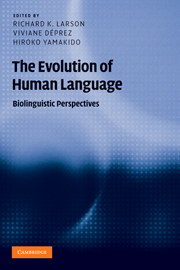Book contents
- Frontmatter
- Contents
- Figures
- Contributors
- Acknowledgments
- Introduction
- 1 The faculty of language: what is it, who has it, and how did it evolve?
- Part I Language architecture
- Part II Language and interface systems
- Part III Biological and neurological foundations
- Part IV Anthropological context
- 13 A putative role for language in the origin of human consciousness
- 14 On two incompatible theories of language evolution
- 15 On the evolution of language: implications of a new and general theory of human origins, properties, and history
- Notes
- References
- Index
13 - A putative role for language in the origin of human consciousness
Published online by Cambridge University Press: 05 June 2012
- Frontmatter
- Contents
- Figures
- Contributors
- Acknowledgments
- Introduction
- 1 The faculty of language: what is it, who has it, and how did it evolve?
- Part I Language architecture
- Part II Language and interface systems
- Part III Biological and neurological foundations
- Part IV Anthropological context
- 13 A putative role for language in the origin of human consciousness
- 14 On two incompatible theories of language evolution
- 15 On the evolution of language: implications of a new and general theory of human origins, properties, and history
- Notes
- References
- Index
Summary
Introduction
As a paleontologist I have no particular expertise in the matter of precisely how language may have originated, or of its neural substrate, or even of how this most human of attributes might most accurately be defined or characterized. But as a student of evolution I may be in a position at least to suggest in what context language – or at least the potential to produce it – was discovered, and to point out the importance that this discovery may have had in releasing the extraordinary – and very generalized – human capacity that so clearly distinguishes our species Homo sapiens today.
Until rather recently, our hominid precusors were non-symbolic, non-linguistic creatures. That is, they almost certainly more closely resembled other primates than modern human beings in the ways in which they perceived, and communicated information about, the world around them. This is not meant to imply that earlier hominids were unsophisticated in their perceptive and communicative abilities, or even that they were necessarily inferior to us in those qualities. It is just to say that they were different, although that difference may well in the end have made them the losers in the grand competition for ecological space and economic resources that played out in Africa, Europe, and Asia toward the end of the last Ice Age.
Information
- Type
- Chapter
- Information
- The Evolution of Human LanguageBiolinguistic Perspectives, pp. 193 - 198Publisher: Cambridge University PressPrint publication year: 2010
Accessibility standard: Unknown
Why this information is here
This section outlines the accessibility features of this content - including support for screen readers, full keyboard navigation and high-contrast display options. This may not be relevant for you.Accessibility Information
- 20
- Cited by
